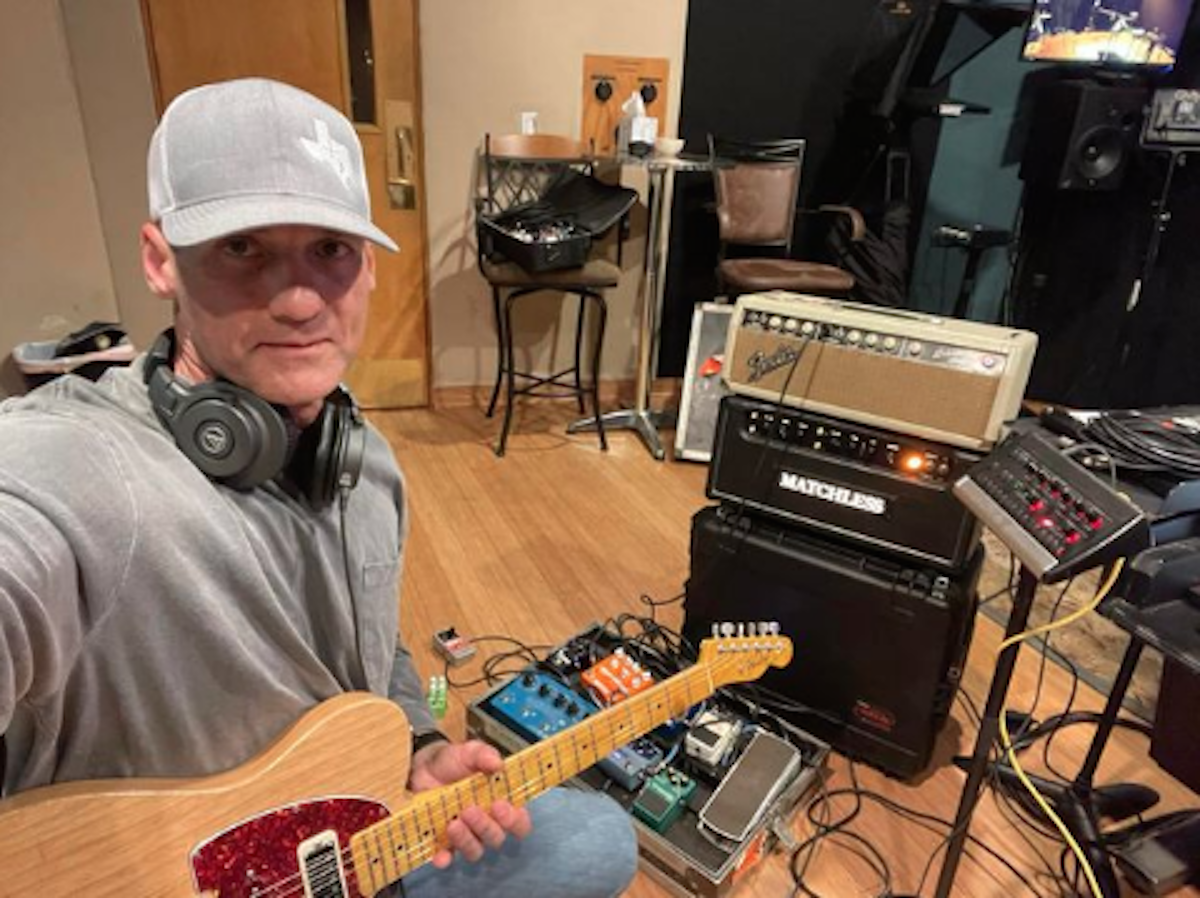More Young People Are Being Impacted by Colorectal Cancer
- Country musician Wade Hayes thought he was “too young,” to get colon cancer, but he was diagnosed with stage 4 cancer at the age of 42 in 2011.
- The now 54-year-old, who went into remission in 2012, shows that the disease can happen to anyone, including younger people.
- A concerning and rising trend shows that more and more young people are developing colon cancer. The National Cancer Institute reports that since the 1990s colorectal cancer cases have been rising among adults younger than 50.
- Research published in CA: A Cancer Journal for Clinicians found the proportion of cases in people younger than 55 years old “increased from 11% in 1995 to 20% in 2019.”
- People are encouraged to talk to their doctors about any unusual symptoms they may be experiencing and ask if earlier screening makes sense for them.
Now, 54, the country music artist is living life to the fullest and doing what he loves most, making music, working on new projects, and spending time with friends and loved ones.

Expert Colon Cancer Resources
- Colorectal Cancer Is On The Rise in Young Adults — Here’s What We Know
- Colorectal Cancer Screening: a New Study Questions the Effectiveness of Colonoscopies But Specialists Reinforce its Importance
- All Americans Should Begin Colorectal Cancer Screening at Age 45, According to New Guidelines; Previous Age Was 50
- Clinical Trials for Colorectal Cancer Can Offer Cutting-Edge Treatment
- Debating Over Treatment of Colorectal Cancer – The New Evidence About Watch and Wait
At first, when Hayes went to a doctor about his symptoms, they weren’t that severe and he thought they maybe had something to do with going to the gym a lot, since he felt he was overall healthy and had no family history of colon cancer.
“At 42, we thought I was ‘too young’ to even be considering colon cancer. But once my abdominal pains and bleeding became more severe, the colonoscopy was recommended,” he explained.
“When we found out that I had cancer, the doctor told me that my tumor was so large on my intestines that I had cancer for years before I knew it,” Hayes continued.
“Looking back on life, I was having symptoms for several years before it got bad enough to get me to go to the doctor. You're really never too young for this disease.”

As for the hardest challenge during his treatment, Hayes said chemotherepy led him to have “bad neuropathy.” According to the National Cancer Institute (NCI), neuropathy is a “nerve problem that causes pain, numbness, tingling, swelling, or muscle weakness in different parts of the body.”
Hayes’ cancer eventually came back in his lymph nodes. Overall, he endured three years of surgery and chemo.
Soon after, Hayes started to “feel like my old self again.”
“I don't know if I'll ever get it back to 100%, but I feel better. In the big picture, I look at it and realize I'm still around. I'm still here and I've got the opportunity to hopefully help prevent somebody from going through what I did,” he added.
Now, Hayes strives to spread awareness for the early detection of colon cancer. In an effort to urge others to get checked, he said, “If you're having any symptoms whatsoever, you need to get checked out. If you have any family history of colon cancer or other related diseases, regardless of your age, you need to get screened.
“And if you're 50, you need to have a screening regardless. You do not want this to happen to you. My life was forever changed the moment the doctor walked in gave me the long-faced. However long I may get to stay on this planet, it's changed forever and it's a change you don't want.”
Regular screening for colon cancer is recommended to begin at age 45, according to the Centers for Disease Control and Prevention.
Colon Cancer Becoming More Common in Young People
Colorectal cancer is a type of cancer that affects your large intestine (or colon) or the end of your intestine, which is your rectum. People may refer to it as colon cancer or rectal cancer, depending on where it began in the body.
The average age people are diagnosed with colon cancer is 68 for men and 72 for women, according to the American Cancer Society, but people at much younger ages are increasingly being diagnosed, researchers say.
“We know rates are increasing in young people, but it's alarming to see how rapidly the whole patient population is shifting younger, despite shrinking numbers in the overall population,” cancer epidemiologist for the American Cancer Society Rebecca Siegel told Axios.
The National Cancer Institute reports that since the 1990s colorectal cancer cases have been rising among adults younger than 50.
And research published in CA: A Cancer Journal for Clinicians found the proportion of cases in people younger than 55 years old “increased from 11% in 1995 to 20% in 2019.”
Dr. Heather Yeo Explains Guidelines And Importance Of Colon Cancer Screening
Researchers are still trying to determine why younger people are being diagnosed in greater numbers. And some experts are pointing to risk factors which include obesity, physical inactivity, and smoking as a possible explanation for the increase.
“Some of those [risk factors] have become more common over the last 45 years, along with this rise in early-onset cases,” NCI program director Phil Daschner recently said, according to the National Cancer Institute.
“We don't know for sure why we are seeing earlier onset and death from colon cancer,” Dr. Heather Yeo, a surgical oncologist who specializes in colorectal cancers at Weill Cornell Medicine, told SurvivorNet.
“It is likely a combination of factors, including diet and genetics as well as access to care and some environmental factors.”
Meanwhile, it’s not simply that typical colon cancers are arising at earlier ages. Research also shows that the colon cancer doctors are seeing in people between the ages of 20 and 49 is different from older-onset colon cancers in many ways.
“Early-onset colorectal cancers seem to be more aggressive and found at later stages in younger adults, but they are not necessarily more fatal if they are caught early,” Yeo explains.
Her study in the journal Clinical Colorectal Cancer, which included 369,796 cases of colorectal cancer, also found that those most likely to get the disease before age 50 are men, African Americans and Hispanics.
Understanding Stage 4 Colon Cancer
Stage four colon cancer, the disease Wade Hayes battled, is when the cancer has spread from the colon to other organs. The most common areas for colon cancer to metastasize (spread) to are the liver, lungs, and peritoneum (the lining in your abdomen).
Each case is very different; therefore, the treatment options differ for each patient.
Treating Stage Four Colon Cancer
Chemotherapy, surgery, or a combination of therapies may be recommended, but individual recommendations depend on where the metastases are located and how widespread the disease is.
Some patients with limited metastases in only one organ may be recommended to undergo surgery, whereas chemotherapy may be indicated in patients who have many metastases or diseases at different sites.
Visit SurvivorNet’s portal for expert resources on the options for treating late-stage colon cancer.
MORE: Clinical Trials for Colorectal Cancer Can Offer Cutting-Edge Treatment
Colon Cancer Risk Factors and Symptoms
Despite the rise in young people getting diagnosed with colon cancer, people over the age of 50 are still at the greatest risk, with this age group making up about 90% of the cases.
Other risk factors of developing colon cancer include:
- Having inflammatory bowel disease.
- Having a family history of colon cancer.
- Not exercising very often.
- Eating a diet high in meat.
- Being overweight or obese.
- Using excessive alcohol and tobacco.
Colon cancer symptoms and warning signs include:
- Change in bowel movement
- Bloody stool
- Diarrhea, constipation or feeling the bowel does not empty completely
- Unexplained weight loss
- Constant abdominal pain or cramps
If you notice concerning symptoms or changes to your body, it's important to discuss them with your doctor promptly.
Contributing: SurvivorNet Staff
Learn more about SurvivorNet's rigorous medical review process.

